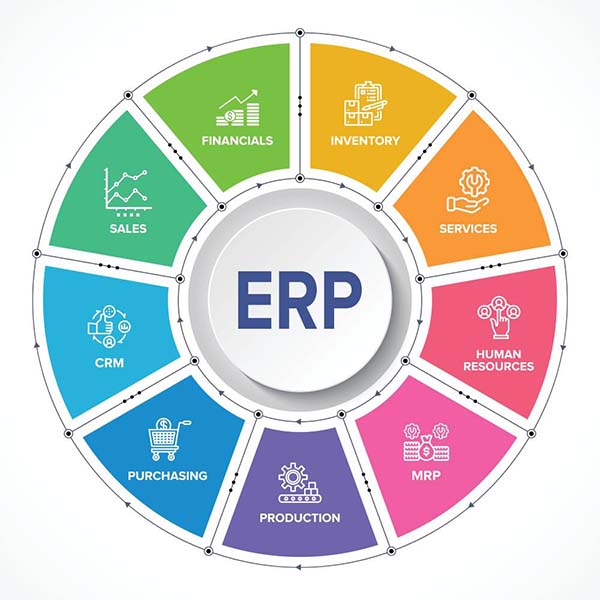Enterprise resource planning (ERP) software is an invaluable tool for companies throughout the modern economy. ERP offers an especially wide range of benefits to manufacturers, machine shops, and businesses in the aerospace and defense industry.
As a centralized solution for managing key business processes, ERP improves visibility into operations, resources, orders, deadlines, and so much more. It positions business leaders to make informed decisions and manage related workflows effectively. By connecting all major aspects of operations, it serves as a single and reliable source of truth.
ERP system integration offers additional value by connecting with other digital tools and systems used by your organization. Keep reading to learn more about ERP and integrations with your other crucial business software. We’ll also discuss building a digital solution designed to sustainably improve operations.
Learn more about the basics of ERP.
Understanding the Scope of Modern ERP
The underlying concepts of ERP date back to the 1960s. In that era, and for decades following it, these early systems were costly and complex to build and maintain. That limited their use to large companies that could afford the investment.
These early versions of ERP (then called material requirements planning — MRP) were limited in scope as well. They provided valuable information about raw materials, inventory, and production. However, they had limited, if any, functionality beyond those supply chain functions.
A variety of factors make modern ERP far more accessible and comprehensive. That includes continued development and reduced costs of hardware and software, among many others. Companies of just about any size can benefit from today’s ERP solutions.
In part, that shift has occurred because the scope of modern ERP extends across all major areas of business operations. The best ERP solutions offer functionality related to the business as a whole, beyond only supply chain management.
That includes human resources, accounting, customer management, and other fields outside of production and the supply chain. That makes ERP relevant and useful across many industries.
The phrase “single source of truth” isn’t just wishful thinking when it comes to modern ERP. With the right strategy, implementation, and ERP integrations, your business can achieve a consistently high level of oversight.
The High Value of Integrated ERP and ERP Modules
ERP can help businesses address a variety of general and unique challenges. It’s a flexible platform that can be tailored to provide a highly relevant and focused solution.
Today’s ERP solutions achieve this balance of broad and specific benefits through modules and integration. Along with the foundational system, your business can choose to add modules that align with its priorities and needs. A module that supports eCommerce ERP integration could be very helpful for some manufacturers but not an especially high priority for others, for example.
Modules can be purchased off the shelf and ready for deployment in some instances. In others, they must be developed based on individual needs. They can provide functionality by themselves or by connecting with other crucial elements of your business software infrastructure.
Consider CRM-ERP integration. If your business already maintains a strong customer database via customer relationship management (CRM) software, integration can bring that data into your ERP system. That helps establish the company wide perspective that drives informed decision-making and provides a reliable single source of truth.
5 Top Benefits of ERP Integration
With a better understanding of ERP integration, it’s time to review the most important advantages that come along with it.
No. 1: A Complete View of Your Organization and Operations
Successful ERP integration means information constantly flows between your ERP and other business-critical systems. If a decision-maker needs to access data or report about anything from the supply chain to HR, they have the means to do so.
That kind of access is invaluable when it comes to complex and influential decisions. When a choice can affect the business as a whole, a complete picture of operations provides valuable context.
No. 2: Inefficiencies and Errors Become Clearer
Slowdowns in production, a lack of raw materials, inefficient scheduling. These issues aren’t necessarily hidden without an integrated ERP system. However, they’re often harder to discover and act on.
With a fully integrated ERP system, it’s easier to identify issues in your business’s key functions. It’s also possible to view and track the negative impacts of those problems across your organization. And to develop a solution that won’t cause unintended consequences in other areas.
No. 3: Fully Leveraging Automation
ERP can easily automate a variety of simple but time-consuming business tasks. Staff in accounting or HR won’t need to spend as much time on basic data entry, for example. Instead, they can use their knowledge and skills to address more complex issues.
ERP integration extends this helpful feature to as many parts of your company as possible. That means more time saved and a more agile, priority-focused workforce, among other benefits.
No. 4: Enhanced Customer Service
Integrating CRM and ERP software can more fully bridge the gap between customers and your key business functions.
Access to all necessary information gives salespeople and customer support specialists more ways to solve a client problem or answer a question. They can quickly look into an order or recent payment and find all relevant data related to it. That makes it easier to find the right path forward.
No. 5: An Individualized Approach to Operations
ERP integration builds connections to your existing infrastructure. If your business relies on specific software to manage processes and workflows, it won’t need to make a massive change to accommodate a new ERP solution. Instead, it can continue enjoying those benefits while also gaining the advantages that come with ERP.
Start your ERP Integration Project with CTND
At CTND, we build teams of dedicated ERP experts. With an emphasis on manufacturers, machine shops, and businesses in the A&D industry, we can deliver industry-focused solutions. Ready to learn more about the benefits of ERP integration? Contact us today!


